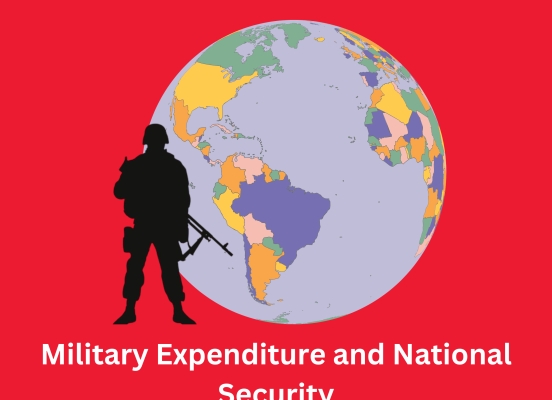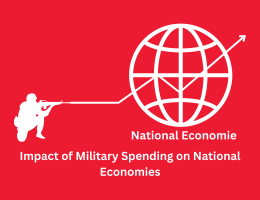
Military Expenditure and National Security: Assessing the Relationship between Defense Spending and a Country's Security Posture
- By admin --
- Saturday, 09 Mar, 2024
Introduction:
Military expenditure is a critical component of national security strategy, reflecting a country's commitment to defense and its perceived threats. This essay explores the intricate relationship between defense spending and a nation's security posture, examining how military budgets influence strategic capabilities, deterrence, and perceptions of security.
Strategic Capabilities and Deterrence:
Military expenditure directly impacts a nation's strategic capabilities by funding the development and maintenance of armed forces, weapons systems, and defense infrastructure. Higher defense spending enables countries to enhance their military readiness, deploy advanced technologies, and maintain a credible deterrent against potential adversaries. For instance, investment in modernizing nuclear arsenals or acquiring cutting-edge military platforms can bolster a country's deterrence posture by signaling its resolve and ability to defend against aggression.
Moreover, military expenditure facilitates force projection capabilities, allowing countries to extend their influence regionally and globally. Through investments in naval fleets, air forces, and expeditionary capabilities, nations can assert their interests, participate in international operations, and respond effectively to emerging security challenges. The ability to project power enhances a country's deterrence posture by demonstrating its capacity to protect vital interests and uphold international stability.
Perceptions of Security and Strategic Autonomy:
Military expenditure also shapes perceptions of security and strategic autonomy, both domestically and internationally. A robust defense budget is often associated with strength, stability, and sovereignty, bolstering confidence among citizens and allies while deterring potential adversaries. Conversely, insufficient investment in defense may be interpreted as a sign of vulnerability or weakness, undermining national security and inviting aggression.
Furthermore, defense spending can influence a country's strategic autonomy by reducing dependence on external security guarantees and fostering self-reliance in defense capabilities. Nations with significant military expenditures may pursue indigenous defense industries, invest in research and development, and cultivate strategic partnerships to enhance their autonomy and resilience in the face of evolving threats. By diversifying defense capabilities and reducing reliance on foreign suppliers, countries can assert greater control over their security policies and decision-making processes.
Economic Considerations and Opportunity Costs:
However, the relationship between military expenditure and national security is not without its complexities, particularly concerning economic considerations and opportunity costs. High levels of defense spending can strain national budgets, diverting resources away from essential social programs, infrastructure development, and economic investments. The opportunity cost of allocating funds to defense may limit resources available for education, healthcare, poverty alleviation, and other critical areas that contribute to long-term national prosperity and well-being.
Moreover, excessive military expenditure can exacerbate fiscal imbalances, contribute to public debt accumulation, and undermine economic stability. The diversion of resources towards defense may crowd out private investment, hinder economic growth, and exacerbate income inequality, particularly in countries with limited fiscal capacity or inefficient defense procurement systems. Balancing defense priorities with socio-economic needs requires careful resource allocation and effective governance to ensure that military spending contributes to national security without compromising broader economic objectives.
Regional Dynamics and Arms Races:
The impact of military expenditure on national security is also influenced by regional dynamics, including arms races, security dilemmas, and alliance structures. High levels of defense spending by neighboring countries or rival powers can fuel arms races, escalate tensions, and destabilize regional security environments. The pursuit of military superiority may provoke countermeasures, exacerbate security dilemmas, and increase the risk of conflict or miscalculation.
Furthermore, alliance commitments and security partnerships can shape defense spending decisions, with countries aligning their military capabilities to collective defense obligations or regional security architectures. NATO member states, for example, are expected to contribute a certain percentage of their GDP to defense spending, reflecting shared security commitments and burden-sharing principles. Similarly, security alliances in Asia-Pacific, such as the U.S.-Japan Security Treaty or the Australia-New Zealand-United States (ANZUS) Treaty, influence defense budgets and strategic priorities in the region.
Conclusion:
To sum up, the association between national security and how much countries pay on armies is complicated. This relationship has strategic, economic and geopolitical aspects. Military spends assist to determine how secure a nation is thereby affecting the way others may perceive it according its mightiness or deterrence capabilities. Moreover, it can hardly be denied that defense budgets have significant impacts on economic factors which are otherwise termed as considerations while looking at regions where they operate.





